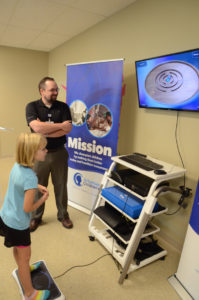
By Steve Brawner
If we’re ever going to fix health care in this country, then places like Arkansas Children’s Hospital and people like Gracie Kimbrell will have to be part of the solution.
At the Arkansas Children’s Nutrition Center, researchers have built only the nation’s second laboratory studying the science of children and exercise. At the Laboratory for Active Kids and Families’ debut Oct. 10, kids ran on a treadmill, tested their strength, and exercised on a stationary bicycle wearing a mask to measure their lung capacity. Stewart O’Malley, 8, shifted her weight on a balancing platform connected to a screen to guide a digital ball through a maze.
By now, we know what makes a healthy human: real food, physical activity, and adequate sleep. Still, there’s always more to learn. Researchers will study children and pregnant mothers. They will be looking for the underlying factors for why some kids are fitter and more active – social, cultural, biological and others. Greg Kearns, Arkansas Children’s chief research officer, said researchers will study the link between exercise and cellular structure, understanding that the cellular doesn’t necessarily follow the lifestyle and that each person is unique. The entire program – not just the lab – is funded through a $7.3 million U.S. Department of Agriculture appropriation.
Meanwhile, in Bryant, kindergarten student Emma Kincaid is able to grasp objects with her left hand for the first time. Born without fingers on that hand, she was fitted with a prosthetic hand built by Gracie Kimbrell and other high school engineering students. As reported by The Saline Courier, Gracie and the other students researched how to make the hand online and then printed it over two days using the school’s 3D printer. It cost about $20, it’s purple, and Emma likes it. A new hand can be printed as she grows, and if a piece breaks, a replacement is easy to produce. Gracie is already working on a better model.
What’s missing from health care policy? Health
For almost a decade, the United States has debated health care policy without focusing much on health. The focus has been on plugging more people into a system that’s expensive, inefficient, impersonal, and often does little to make us better. One of the biggest myths in American politics is that Obamacare was a radical change. The truth is, it’s biggest fault was that it was just more of the same – better in some ways, worse in others, but ultimately still hugely bureaucratic at its core.
The entire system needs a complete reorientation that will require changes in the wider culture. Somehow, Americans must adopt healthier lifelong lifestyles. Maybe Children’s Hospital’s efforts will help. Having more knowledge doesn’t always change people’s behavior, but it can. One example is an increase in breastfeeding as science has shown its benefits, another subject studied at Children’s.
Meanwhile, health care must be more personal and accessible, and cheaper. One can only imagine how many tens of thousands of dollars Emma’s prosthetic hand would have cost had she obtained it through the system and its bureaucracy.
The United States is a place of limited means. The health care system does some things well, but it has grown to one-sixth of the economy, twice that of many countries, while often yielding no better results. This hurts Americans in many different ways. Health care is one of the primary drivers of the $20.4 trillion national debt, equal to $63,000 for every American. Wondering why you haven’t gotten a raise lately? You did. Your employer paid more for your insurance.
In many parts of the economy, technology has led to cost savings, but not in medicine. In medicine, it’s made everything much more expensive. But maybe Gracie Kimbrell is showing us a new path. A high school student printed a prosthetic hand for $20. Can the medical-insurance-government complex follow her lead?
If not, maybe we’ll have to do some of it ourselves, like Gracie did, and maybe technology will enable us. Like the United States, the average American is of limited means, too.
© 2017 by Steve Brawner Communications, Inc.